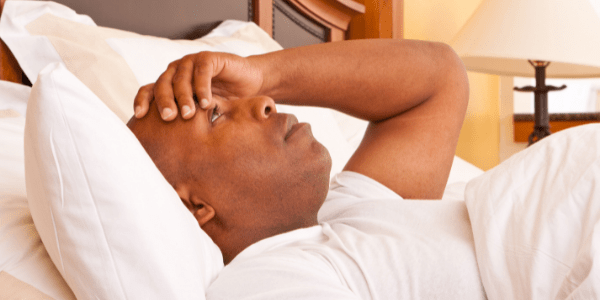Insomnia – The Doctor’s Recommendations For a Peaceful Night’s Rest
By Dr. Chantal Lewis, MD
Have you ever gone to bed, only to toss and turn for several hours before falling asleep, or do you fall asleep and then wake up a few hours later unable to return to sleep? If these experiences sound familiar, then perhaps you may have insomnia. Insomnia, which is quite common among patients, is defined as difficulty falling asleep or staying asleep. Most adults need approximately seven to eight hours of sleep to function normally throughout the day. Inadequate amounts of sleep can lead to impaired memory and poor physical performance.

Sleep, which is a period of rest for the body, involves four different stages. These stages include stages one, two, three, and REM sleep. During sleep, we progress in a cycle from stage one to REM (rapid eye movement) sleep. The cycle then repeats again starting with stage one. Most individuals will spend almost fifty percent of their total sleep time in stage two sleep. Another twenty percent is spent in REM sleep and the remaining thirty percent is in the other stages. Deep sleep occurs during the third stage of sleep. It may be difficult to wake an individual during this stage of sleep.
The causes of insomnia vary. Insomnia may be primary, where the cause of the insomnia is not related to any other health condition or it can be secondary, where the cause is related to another chronic illness or comorbidity. Illnesses such as sleep apnea, restless leg syndrome, thyroid disorders, and mood disorders such as depression or anxiety can cause insomnia. With the holiday season fast approaching, many individuals may find themselves under stress as they prepare to host family friends and other individuals may become depressed or have a dampened mood if they are separated from loved ones and are spending the holidays alone. In both situations, insomnia may become more prominent. Certain medications may also cause insomnia. Behavioral or social issues such as taxing work schedules and having a partner that snores may also be associated with insomnia.
Treatment for insomnia varies and can range from lifestyle modifications, over-the-counter remedies, and or prescription medications. Helpful lifestyle modifications include exercising regularly, avoiding large meals at night, and limiting caffeine and alcohol intake. Maintaining a regular sleep schedule (going to bed and waking up at the same time) on a regular basis is also helpful. When anxiety and depression, may be contributing to insomnia, relaxation training and cognitive behavioral therapy may be beneficial.
While lifestyle modifications are the mainstay of treatment, some patients may require medications. Over-the-counter treatments include valerian root, melatonin, and Benadryl. While Benadryl does have sedating effects, it should be avoided in patients with glaucoma or urinary retention. If behavioral modifications and over-the-counter medications are not helpful, prescription treatment options could include pills such as Ambien and Lunesta. Patients should consult a physician before starting any medications.
While insomnia is a common ailment for many, it does not have to go untreated. Restful sleep is an important process for a healthy life. If you think you may have insomnia, consult your primary care physician for an in-depth evaluation.
This article is meant for educational purposes only and is not meant to take the place of medical advice from licensed medical professionals.





